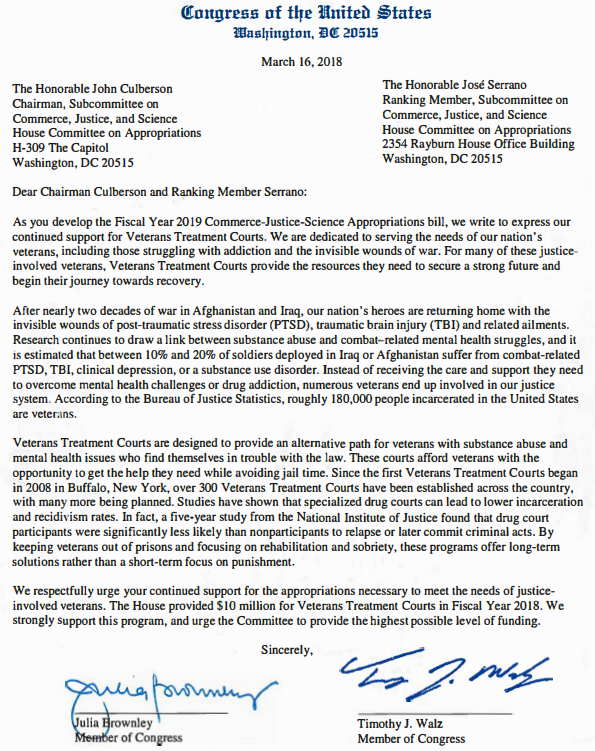
Washington, D.C. – Last week, Congresswoman Julia Brownley (D-CA) spearheaded an effort by more than 90 Members of Congress to call for continued support for Veterans Treatment Courts – locally driven programs that integrate community and VA resources and services to help veterans caught in the justice system who are struggling with mental health or substance abuse issues. In FY 2018, the House provided $10 million for Veterans Treatment Courts, and the letter urges the Appropriations Committee to provide the highest possible level of funding for FY 2019.
“When veterans come home with the invisible wounds of war, they can sometimes end up on the wrong path,” said Congresswoman Brownley. “We owe our veterans a debt of gratitude for their service, and we need to do everything we can to help them get back on track to lead productive, fulfilling lives. Veterans Treatment Courts are an integral part of that process, and they need to be funded appropriately.”
The letter was signed by Reps. Julia Brownley, Vicente Gonzalez, Mark DeSaulnier, Debbie Dingell, Tom O’Halleran, Eric Swalwell, Joyce Beatty, Ann McLane Kuster, Salud O. Carbajal, Josh Gottheimer, Michelle Lujan Grisham, Alma S. Adams, Barbara Comstock, Mike Thompson, Ted W. Lieu, Val Butler Demings, Anna G. Eshoo, Reuben J. Kihuen, Pramila Jayapal, Richard E. Neal, Jacky Rosen, Denny Heck, Charlie Crist, Jamie Raskin, Filemon Vela, James P. McGovern, Ro Khanna, Sean Patrick Maloney, Lois Frankel, J. Luis Correa, Earl Blumenauer, Scott H. Peters, Brendan F. Boyle, Robert C. “Bobby” Scott, Susan Davis, Ruben Gallego, Nanette Diaz Barragán, Beto O’Rourke, Al Lawson, Seth Moulton, Michael E. Capuano, Darren Soto, Ami Bera, Tulsi Gabbard, Tony Cárdenás, Anthony G. Brown, Kathleen M. Rice, Dave Loebsack, Carol Shea-Porter, Donald Norcross, Juan Vargas, Grace F. Napolitano, Adriano Espaillat, John K. Delaney, Bill Johnson, Norma J. Torres, Kyrsten Sinema, Robert A. Brady, Kathy Castor, Paul A. Gosar D.D.S., Yvette D. Clarke, James R. Langevin, G.K. Butterfield, Dianna DeGette, Peter A. DeFazio, André Carson, Eleanor Holmes Norton, Chellie Pingree, Sheila Jackson Lee, Bobby L. Rush, Terri A. Sewell, Collin C. Peterson, Gerald E. Connolly, Karen Bass, Keith Ellison, Adam Smith, Stephen F. Lynch, Timothy J. Walz, Linda T. Sánchez, Emanuel Cleaver, Albio Sires, Daniel W. Lipinski, William R. Keating, Alcee L. Hastings, Jan Schakowsky, Steve Cohen, Gregorio Kilili Camacho Sablan, Judy Chu, Madeleine Z. Bordallo, Ted Deutch, and Eddie Bernice Johnson.
The full text of the letter can be found here and below:
The Honorable John Culberson
Chairman, Subcommittee on Commerce, Justice, and Science
House Committee on Appropriations
H-309 The Capitol
Washington, DC 20515
The Honorable José Serrano
Ranking Member, Subcommittee on Commerce, Justice, and Science
House Committee on Appropriations
2354 Rayburn House Office Building
Washington, DC 20515
Dear Chairman Culberson and Ranking Member Serrano:
As you develop the Fiscal Year 2019 Commerce-Justice-Science Appropriations bill, we write to express our continued support for Veterans Treatment Courts. We are dedicated to serving the needs of our nation’s veterans, including those struggling with addiction and the invisible wounds of war. For many of these justice-involved veterans, Veterans Treatment Courts provide the resources they need to secure a strong future and begin their journey towards recovery.
After nearly two decades of war in Afghanistan and Iraq, our nation’s heroes are returning home with the invisible wounds of post-traumatic stress disorder (PTSD), traumatic brain injury (TBI) and related ailments. Research continues to draw a link between substance abuse and combat–related mental health struggles, and it is estimated that between 10% and 20% of soldiers deployed in Iraq or Afghanistan suffer from combat-related PTSD, TBI, clinical depression, or a substance use disorder. Instead of receiving the care and support they need to overcome mental health challenges or drug addiction, numerous veterans end up involved in our justice system. According to the Bureau of Justice Statistics, roughly 180,000 people incarcerated in the United States are veterans.
Veterans Treatment Courts are designed to provide an alternative path for veterans with substance abuse and mental health issues who find themselves in trouble with the law. These courts afford veterans with the opportunity to get the help they need while avoiding jail time. Since the first Veterans Treatment Courts began in 2008 in Buffalo, New York, over 300 Veterans Treatment Courts have been established across the country, with many more being planned. Studies have shown that specialized drug courts can lead to lower incarceration and recidivism rates. In fact, a five-year study from the National Institute of Justice found that drug court participants were significantly less likely than nonparticipants to relapse or later commit criminal acts. By keeping veterans out of prisons and focusing on rehabilitation and sobriety, these programs offer long-term solutions rather than a short-term focus on punishment.
We respectfully urge your continued support for the appropriations necessary to meet the needs of justice-involved veterans. The House provided $10 million for Veterans Treatment Courts in Fiscal Year 2018. We strongly support this program, and urge the Committee to provide the highest possible level of funding.
Sincerely,
Issues: 115th Congress, Veterans' Affairs